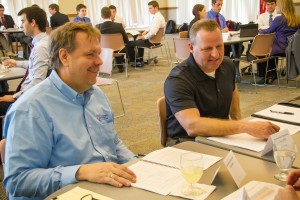
During spring semester, students in a UW-La Crosse Labor Economics course assisted community clients with labor market research. Here UWL students Shaun Fleischhacker and Marissa Eckrote, both right, meet with client, Sarah Fecht, vice president of human resources at Community Credit Union, for a round table discussion.
UW-La Crosse (UWL) business student Shaun Fleischhacker helped solve a problem for a La Crosse business: how to expand its applicant pool in a competitive market.
He learned how to apply economic models, write business reports and communicate with real-world clients. Moreover, he gained a new appreciation for what he can do in his field of study.
“Economics has so much application to the real world,” says Fleischhacker.
During spring semester, students in Economics 330: Labor Economics conducted labor market research and economics consulting projects for seven area organizations. Issues they studied varied from how to effectively use incentives to motivate job performance to forecasting how the change in Minnesota’s minimum wage may affect employers in Wisconsin.
“I wanted to show students how the tools we learn in lecture and in textbook readings can actually be applied on the job to deliver value to organizations,” says Mary Hamman, the course instructor. “In many economics courses, we focus a lot on stylized models, which are great for building an analytical tool kit, but we don’t have the time or opportunity to extend those tools to messy, real-life situations. I also wanted area employers to see that our economists can do more than just complex math — they’re innovative problem solvers.”
The benefits of working together
UWL faculty frequently partner with community clients to provide students with real-world research and project management experience.
“Students are more motivated to learn when they know their work matters outside the classroom,” notes Hamman.
Tom Gilbertson, plant manager for International Ingredient Corp. in Whitehall, was so impressed with Economics 330 students’ professionalism and quality work that his company made a donation to the CBA.
“This wasn’t just a field trip for them or project they had to get done,” explains Gilbertson. “It’s something they definitely participated in with a lot of heart.”

Tom Gilbertson, plant manager for International Ingredient Corp. in Whitehall, Wisconsin, left, and a partner in hiring, Tim Vondrasek, of Express Employment Professionals, meet with UW-La Crosse students to discuss labor market research students can do for the organization.
International Ingredient Corp. asked students to look at how the company could remain competitive attracting employees in Trempealeau County, nestled between two large cities in a region “saturated with manufacturing jobs,” explains Gilbertson.
Gilbertson was looking for alternatives beyond just raising wages above the competition. Among other solutions, students proposed marketing a natural perk of employees’ work schedules: flexible break times. It’s something Gilbertson hadn’t thought of, but now plans to do.
Similiarly, Fleischhacker’s group provided Community Credit Union in La Crosse with some suggestions on how to broaden its applicant pool. Students found comparable jobs in the market where the credit union could look to hire, studied U.S. Census data on unemployment and surveyed current employees. They suggested offering a mentoring program to entry-level employees and educational loan assistance.
Community Credit Union is now looking into providing both of these benefits, says Sarah Fecht, vice president of Human Resources at Community Credit Union. She calls the project a worthwhile use of the company’s time and resources.
“It allows us to have a group of students very engaged in work on a project that we may not have had time to work on,” she says.
Hamman watched her students build confidence in their abilities as they received positive feedback like this from clients. “Working with external organizations adds an authenticity to the work that I cannot achieve on my own despite my own non-academic work experience,” she says.
Do you have an idea for an economics course project? Mary Hamman, assistant professor of Economics, and her colleagues would like to continue to learn about the needs of local businesses to help inspire meaningful classroom experiences for students assisting community businesses. Contact Hamman with ideas at mhamman@uwlax.edu.
